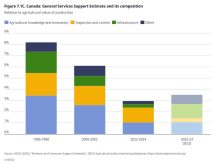Municipalities are not happy with what they say are federal policies that pass unexpected policing costs to local governments.
The issue tracks back to the last collective agreement between the federal government and the RCMP.
Why it matters: Municipalities say they did not get enough input on the RCMP’s union deal.
Read Also

Manitoba Ag Days 2026: Local businesses gear up for Brandon farm show
Most of agriculture is seemingly at Manitoba Ag Days each January: Manitoba agribusinesses and farm groups look forward to connecting with farmers at the 2026 show.
The agreement, which came into force in August 2021 and expired at the end of March 2023, included pay raises just shy of 24 per cent for both regular members and reservists. The federal government said the increases put RCMP pay in line with other police in Canada, such as the Ontario Provincial Police.
The deal included retroactive pay increases to April 2017.
Municipalities have been lobbying the federal government to shoulder that retroactive price tag. When the federal budget dropped in late March, however, it did not include promises to absorb those costs. Instead, it included an extension for municipalities that contract with the RCMP to pay the funds.
The Federation of Canadian Municipalities released a response March 29. In that statement, FCM president Taneen Rudyk said municipalities were not at the negotiating table, despite being on the hook for the costs of the deal.
Some municipalities got cost estimates, she said. Portage la Prairie, for example, received a cost estimate of $800,000, but “these turned out to be far below the final agreement’s increase over six years.”
In an online backgrounder, the federal government said the complexity of calculating retroactive payments prevented exact amounts from being known until final payments were processed.
“The federal government’s refusal to absorb these costs, which were essentially negotiated with municipal money but not with municipal input, is not acceptable,” Rudyk said.
“Municipal councils will be forced to make incredibly tough decisions, such as making cuts to essential services or passing the bill along to residents, at a time when Canadians’ concerns about local safety and the cost of living are already rising.
“This situation cannot occur again,” she added. “Going forward, municipalities must be properly consulted on issues related to policing costs given the municipal responsibility to keep our communities safe.”
Rudyk said municipalities cannot run deficits, unlike provinces or the federal government.
Municipal organizations at the provincial level also expressed their disappointment.
In an April 4 statement, the Association of Manitoba Municipalities joined counterparts from the rest of the Prairies, British Columbia and Nova Scotia in decrying the perceived budgetary gap.
“Municipalities were not meaningfully consulted during these negotiations, despite being paying contract partners,” the AMM said. “The federal government’s unwillingness to absorb these costs will directly result in significant property tax increases, delayed infrastructure projects, and other cost-cutting measures to the detriment of local communities at a time when municipalities are dealing with inflationary pressures and affordability concerns from ratepayers.”
The joint statement asked the federal government to reconsider the matter. It represented views from the Union of British Columbia Municipalities, Alberta Municipalities, Rural Municipalities of Alberta, Saskatchewan Urban Municipalities Association, Saskatchewan Association of Rural Municipalities, AMM and Nova Scotia Federation of Municipalities.
Negotiations are ongoing on the next RCMP collective agreement.















